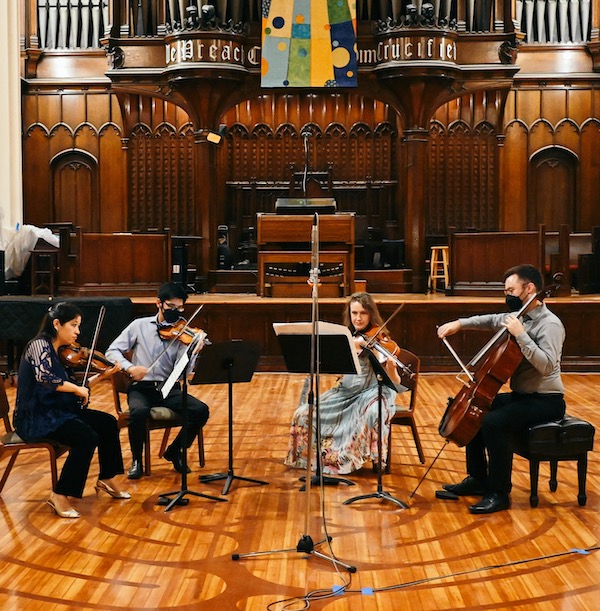Momenta Quartet opens festival with luminous lineup
Postponed from June—when it would have ended the 2021-22 classical music season in New York—the Momenta Festival opened Thursday night as an ideal way to help launch the new season.
The festival is created by the Momenta Quartet, each member picking the program for one of the four concerts. The music spans the 19th to 21st centuries, but for this performance at Broadway Presbyterian Church cellist Michael Haas chose three contemporary works: Elizabeth Brown’s Just Visible in the Distance, Valentin Silvestrov’s String Quartet No. 3, and Thy Wondering Eyes, by Shawn Jaeger. This made for an involving concert that covered a wide and deep emotional territory.
(There was an added poignancy in the Quartet’s dedication of the festival to Peter Pohly, an avid concertgoer who passed away this summer and probably heard more new music each season than all city critics put together.)
All the music was directly in the classical tradition as heard through contemporary sensibilities and views of the past. There was also, in one way or another, a narrative quality to each work, at the very least a sense of drama that is the linchpin of tonal harmony.
Brown’s narrative sense was strong if once-removed. Her piece started with her thoughts on a book she loves, The Rings of Saturn, by W. G. Sebald. Just Visible in the Distance is a translation of the book into music, Brown expressing her impressions of and response to it in musical sound. That sound was marvelous.
In two connected sections, the music had a free flow that began and returned on a couple of thematic ideas. One was a kind of rocking music, the violins playing silvery arcs above a descending cadence in the viola and cello. Played without vibrato, this felt like the Renaissance string music of a composer like Lawes or Purcell. The music then followed an interior, intuitive drift to melodic and polyphonic material, with one of the quartet members singing long tones while playing. The minor-key tonality and counterpoint hinted at both early music and a romantic-era pictorialism.
The interiority of the music was reinforced by the quartet’s precise intonation and graceful phrasing. By playing the music so beautifully, Momenta gave it the weight of expression it deserved without confining it to a single image or meaning. The experience was rich and evocative.
That feeling extended through Silvestrov’s excellent Third Quartet. This shared some sensibility with the opening piece, in that it used some basic, long-standing formal ideas that the Ukrainian composer stripped to the basics and extended in subtle ways. The continuous sections have markings like Prelude, Pastoral, and Intermezzo, and scale both harmonies and moods. The harmonic tension and drama of the Prelude is intense and brittle, ready to disintegrate into something else.
That is a sequence of music that moved through gentle, luminous passages and others that were psychologically attenuated, obsessing over a basic, fraught feeling. This was another musical narrative, through sensations and out to a final, but unresolved, Postlude. Momenta played this all with a light understatement that deepened the music. Silvestrov eschews ornamentation but embraces elegance, and the plain-speaking of the playing opened up space to relish each passing moment.
Thy Wondering Eyes had moments of the same kind of beauty as the previous works, but was also far more extroverted, even exuberant and chaotic. Jaeger worked from the idea of Old Regular Baptist hymnbooks, which have the words but no music—the singers learn this orally and as a group have a looser, heterogenous quality than musicians following scores.
The piece starts in a fairly close unison, but then the instruments take their own path through material that keeps them together as a group. There is far more violence in this piece than one imagines in an Old Regular service, and some of the sensations are dark, the feeling of a group turning into a crowd and then into a mob. That complexity in the performance was rather unbalancing, but in the end the energy of this excellent concert proved both positive and thoughtful.
The Momenta Festival continues through Sunday at the Broadway Presbyterian Church. Concerts are free with a suggested donation. momentaquartet.com
